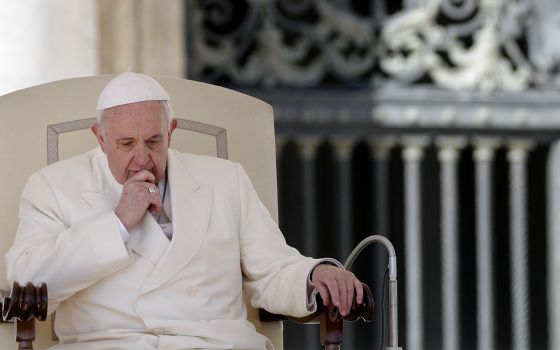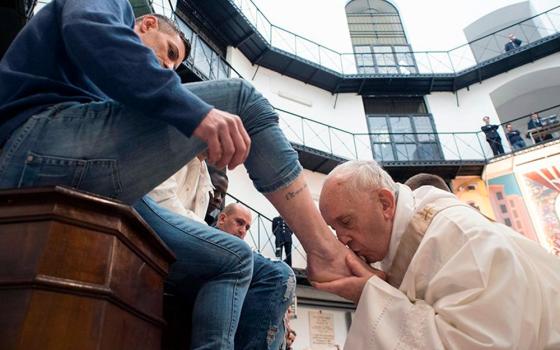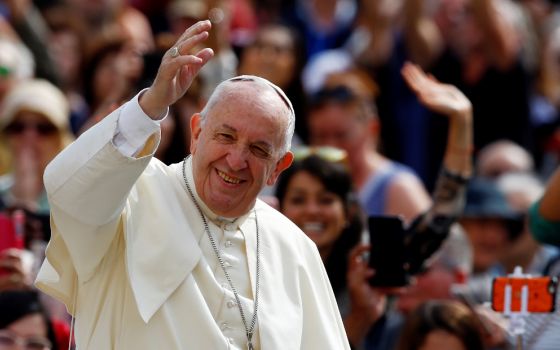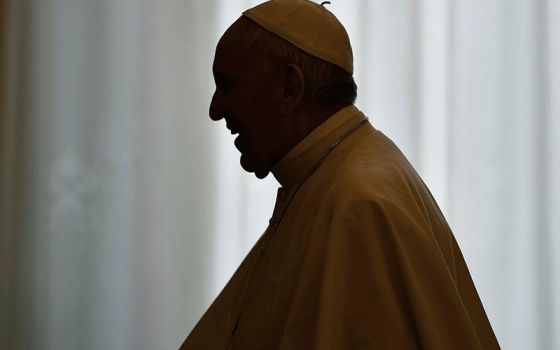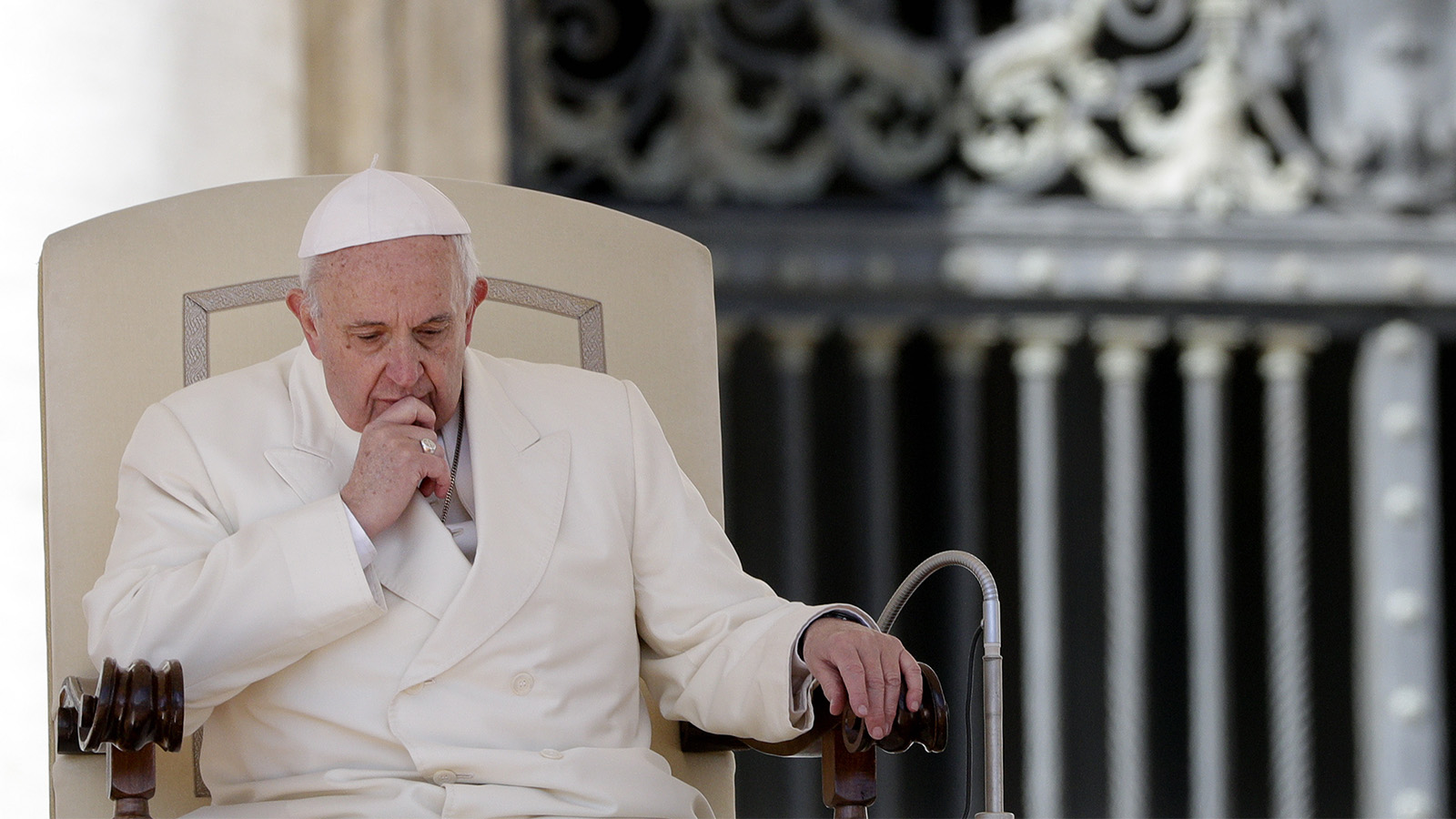
Pope Francis listens to his message being delivered in several languages during his weekly general audience in St. Peter's Square, at the Vatican, on March 21, 2018. (AP/Andrew Medichini)
Spirituality, whether Christian or Muslim, frequently uses the language of battle, so it is not surprising that Pope Francis promotes the Christian equivalent of a spiritual jihad. Many in the West think jihad only means warfare, whereas it can also mean the spiritual struggle within oneself against sin. In the final chapter of "Gaudete et Exsultate" ("Rejoice and Be Glad"), Francis uses similar language when he writes that "the Christian life is a constant battle." For him, this battle is not just against the world and our human weakness but also against the devil himself.
(In earlier columns, I discussed chapters 1, 2, 3 and 4.)
For Francis, the devil is not a mythical figure but real. "It is precisely the conviction that this malign power is present in our midst that enables us to understand how evil can at times have so much destructive force," he writes. "We should not think of the devil as a myth, a representation, a symbol, a figure of speech or an idea. This mistake would lead us to let down our guard, to grow careless and end up more vulnerable."
Francis is not talking about diabolic possession. Rather, he believes the devil "poisons us with the venom of hatred, desolation, envy and vice. When we let down our guard, he takes advantage of it to destroy our lives, our families and our communities."
In this spiritual combat, Christians have weapons given by the Lord, writes Francis: "faith-filled prayer, meditation on the word of God, the celebration of Mass, Eucharistic adoration, sacramental Reconciliation, works of charity, community life, missionary outreach."
In short, he argues, "the cultivation of all that is good, progress in the spiritual life and growth in love are the best counterbalance to evil."
The Christian struggle, according to Francis, is not just against sin but also against lethargy, where the spiritual life gradually turns lukewarm and "everything then appears acceptable: deception, slander, egotism and other subtle forms of self-centeredness."
For this reason, Francis writes, we need to "know if something comes from the Holy Spirit or if it stems from the spirit of the world or the spirit of the devil." This lead Francis to his favorite topic: discernment, a gift we must pray for and develop "through prayer, reflection, reading and good counsel."
For Francis, discernment is reflection and prayer that leads to decisions in keeping with God's plan for us.
"Without the wisdom of discernment, we can easily become prey to every passing trend," he writes. Are we chasing after novelty or are we resistant to change? Christ wants his followers to be free, and in order to be truly free, Francis explains, "he asks us to examine what is within us — our desires, anxieties, fears and questions — and what takes place all around us — 'the signs of the times' — and thus to recognize the paths that lead to complete freedom."
Advertisement
Francis believes that discernment is not just for extraordinary, life-changing decisions. "We need it at all times," he teaches, "lest we fail to heed the promptings of his grace and disregard his invitation to grow."
"Often discernment is exercised in small and apparently irrelevant things," Francis continues, "since greatness of spirit is manifested in simple everyday realities. It involves striving untrammeled for all that is great, better and more beautiful, while at the same time being concerned for the little things, for each day"s responsibilities and commitments."
Francis acknowledges the importance of psychological and sociological insights in decision-making. But discernment is more than that. It is a grace nourished in prayer. "It seeks a glimpse of that unique and mysterious plan that God has for each of us, which takes shape amid so many varied situations and limitations," he writes. "It involves more than my temporal well-being, my satisfaction at having accomplished something useful, or even my desire for peace of mind."
For a Christian, according to Francis, discernment "has to do with the meaning of my life before the Father who knows and loves me, with the real purpose of my life, which nobody knows better than he."
This is why Francis calls discernment a gift and argues that we must therefore be willing to listen to the Lord and others. "Only if we are prepared to listen," writes Francis, "do we have the freedom to set aside our own partial or insufficient ideas, our usual habits and ways of seeing things."
Discernment requires obedience to the gospel and the church teaching, but, "It is not a matter of applying rules or repeating what was done in the past," he advises, "since the same solutions are not valid in all circumstances and what was useful in one context may not prove so in another." In fact, "the discernment of spirits liberates us from rigidity, which has no place before the perennial "today" of the risen Lord," according to Francis.
Discernment also requires understanding God"s patience and timetable. Citing the Gospels, Francis notes that "God does not pour down fire upon those who are unfaithful (cf. Luke 9:54), or allow the zealous to uproot the tares growing among the wheat (cf. Matthew 13:29)." Discernment also requires generosity, understanding that it is more blessed to give than receive. Discernment, like all of Christianity, must embrace the full gospel, including the cross.
In this spiritual battle, we are not alone. "We need, though, to ask the Holy Spirit to liberate us and to expel the fear that makes us ban him from certain parts of our lives," Francis concludes. "God asks everything of us, yet he also gives everything to us." The God of Francis "does not want to enter our lives to cripple or diminish them, but to bring them to fulfillment."
As a result, discernment, according to Francis, "is not a solipsistic self-analysis or a form of egotistical introspection, but an authentic process of leaving ourselves behind in order to approach the mystery of God, who helps us to carry out the mission to which he has called us, for the good of our brothers and sisters."
[Jesuit Fr. Thomas Reese is a columnist for Religion News Service and author of Inside the Vatican: The Politics and Organization of the Catholic Church.]





